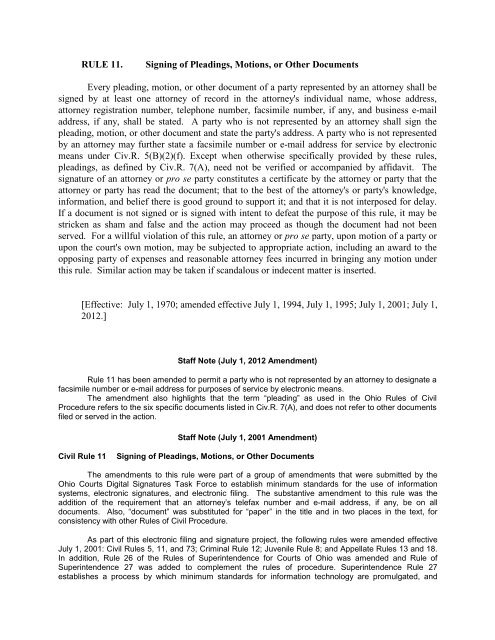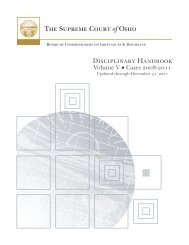Ohio Rules of Civil Procedure - Supreme Court
Ohio Rules of Civil Procedure - Supreme Court
Ohio Rules of Civil Procedure - Supreme Court
You also want an ePaper? Increase the reach of your titles
YUMPU automatically turns print PDFs into web optimized ePapers that Google loves.
RULE 11. Signing <strong>of</strong> Pleadings, Motions, or Other Documents<br />
Every pleading, motion, or other document <strong>of</strong> a party represented by an attorney shall be<br />
signed by at least one attorney <strong>of</strong> record in the attorney's individual name, whose address,<br />
attorney registration number, telephone number, facsimile number, if any, and business e-mail<br />
address, if any, shall be stated. A party who is not represented by an attorney shall sign the<br />
pleading, motion, or other document and state the party's address. A party who is not represented<br />
by an attorney may further state a facsimile number or e-mail address for service by electronic<br />
means under Civ.R. 5(B)(2)(f). Except when otherwise specifically provided by these rules,<br />
pleadings, as defined by Civ.R. 7(A), need not be verified or accompanied by affidavit. The<br />
signature <strong>of</strong> an attorney or pro se party constitutes a certificate by the attorney or party that the<br />
attorney or party has read the document; that to the best <strong>of</strong> the attorney's or party's knowledge,<br />
information, and belief there is good ground to support it; and that it is not interposed for delay.<br />
If a document is not signed or is signed with intent to defeat the purpose <strong>of</strong> this rule, it may be<br />
stricken as sham and false and the action may proceed as though the document had not been<br />
served. For a willful violation <strong>of</strong> this rule, an attorney or pro se party, upon motion <strong>of</strong> a party or<br />
upon the court's own motion, may be subjected to appropriate action, including an award to the<br />
opposing party <strong>of</strong> expenses and reasonable attorney fees incurred in bringing any motion under<br />
this rule. Similar action may be taken if scandalous or indecent matter is inserted.<br />
[Effective: July 1, 1970; amended effective July 1, 1994, July 1, 1995; July 1, 2001; July 1,<br />
2012.]<br />
Staff Note (July 1, 2012 Amendment)<br />
Rule 11 has been amended to permit a party who is not represented by an attorney to designate a<br />
facsimile number or e-mail address for purposes <strong>of</strong> service by electronic means.<br />
The amendment also highlights that the term “pleading” as used in the <strong>Ohio</strong> <strong>Rules</strong> <strong>of</strong> <strong>Civil</strong><br />
<strong>Procedure</strong> refers to the six specific documents listed in Civ.R. 7(A), and does not refer to other documents<br />
filed or served in the action.<br />
Staff Note (July 1, 2001 Amendment)<br />
<strong>Civil</strong> Rule 11 Signing <strong>of</strong> Pleadings, Motions, or Other Documents<br />
The amendments to this rule were part <strong>of</strong> a group <strong>of</strong> amendments that were submitted by the<br />
<strong>Ohio</strong> <strong>Court</strong>s Digital Signatures Task Force to establish minimum standards for the use <strong>of</strong> information<br />
systems, electronic signatures, and electronic filing. The substantive amendment to this rule was the<br />
addition <strong>of</strong> the requirement that an attorney’s telefax number and e-mail address, if any, be on all<br />
documents. Also, “document” was substituted for “paper” in the title and in two places in the text, for<br />
consistency with other <strong>Rules</strong> <strong>of</strong> <strong>Civil</strong> <strong>Procedure</strong>.<br />
As part <strong>of</strong> this electronic filing and signature project, the following rules were amended effective<br />
July 1, 2001: <strong>Civil</strong> <strong>Rules</strong> 5, 11, and 73; Criminal Rule 12; Juvenile Rule 8; and Appellate <strong>Rules</strong> 13 and 18.<br />
In addition, Rule 26 <strong>of</strong> the <strong>Rules</strong> <strong>of</strong> Superintendence for <strong>Court</strong>s <strong>of</strong> <strong>Ohio</strong> was amended and Rule <strong>of</strong><br />
Superintendence 27 was added to complement the rules <strong>of</strong> procedure. Superintendence Rule 27<br />
establishes a process by which minimum standards for information technology are promulgated, and

















